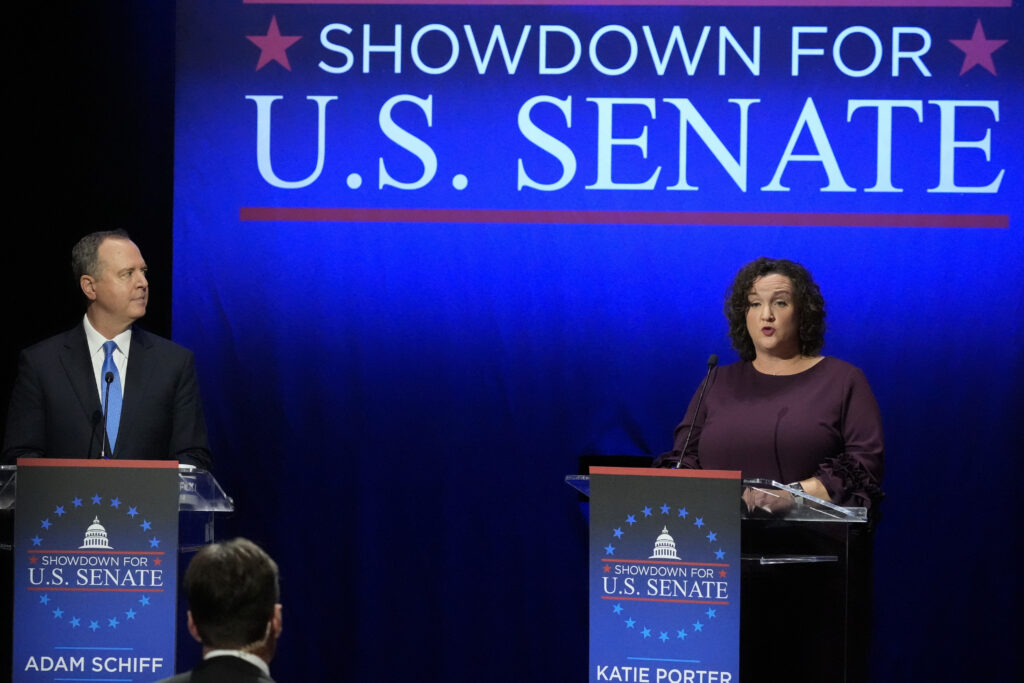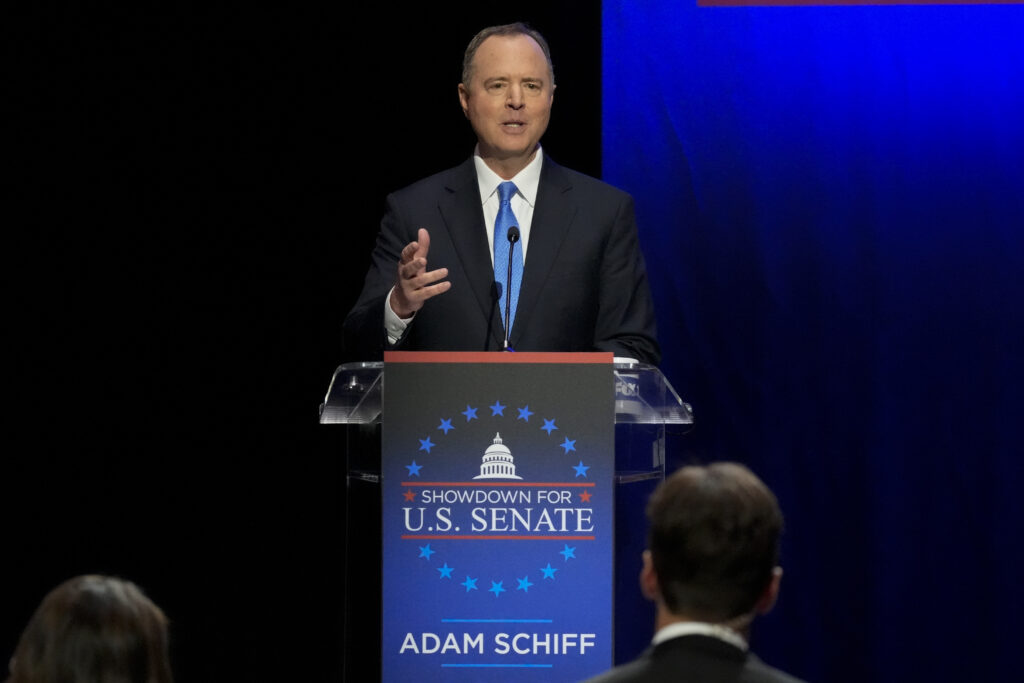Senate candidates clash in first debate

US Rep. Adam Schiff, D-Calif., left, looks on as US Rep. Katie Porter, D-Calif., speaks during a televised debate for candidates in the senate race to succeed the late California Sen. Dianne Feinstein, Monday, Jan. 22, 2024, in Los Angeles. (AP Photo/Damian Dovarganes)
LOS ANGELES – The three Democrats in the first debate in the race to succeed the late Sen. Dianne Feinstein traded barbs and criticisms last night as they sought to differentiate themselves on key issues and attempted to corner the lone Republican on the stage, former Los Angeles Dodgers star Steve Garvey.
Reps. Adam Schiff, Katie Porter and Barbara Lee tried to pin down Garvey as to whether he supports former President Donald Trump.
Schiff pointed out that Garvey voted for Trump twice, and pressured him to answer whether he would vote for the former president again.
“…You won’t tell the public whether you’ll support this man again. You saw what he did on January 6,” Schiff said, referring to the events that followed that day in 2017 when a mob of Trump supporters attacked the US Capitol in Washington, DC.
Garvey responded that their remarks were an example of “identity politics as its finest.” The Republican emphasized that he makes his decisions, though he did say that President Joe Biden had not been good for the country.

US Rep. Adam Schiff, D-Calif., speaks during a televised debate for candidates in the senate race to succeed the late California Sen. Dianne Feinstein, Monday, Jan. 22, 2024, in Los Angeles. (AP Photo/Damian Dovarganes)
In response to a question about the Israel-Hamas war, Lee said she has called for an immediate and permanent ceasefire and noted that the 25,000 Palestinian deaths, according to Hamas-run Gaza Health Ministry, is “counterproductive” to Israel’s security and that a “political and diplomatic solution” would be the best path to peace.
Schiff, D-Burbank, acknowledged the lives lost on both sides, and backed that Israel has a right to defend itself. Porter said the U.S. needs to push for the conditions that will lead to a “bilateral durable peace.”
Porter, D-Irvine, said ceasefire is not a “magic word” in that you can’t say it and make it so, which elicited a response from Lee saying that a ceasefire needs to happen now, if not more people will die.
Garvey, who said Israel has the right to fight back, quickly received backlash from Porter and Lee.
Lee, D-Oakland, retorted the US policy is to support a two-state solution, and pushed Garvey to elaborate on what’s his vision for the people of Gaza. The Republican said it was naive to think that a two-state solution can happen as the situation between Israel and Palestinians goes back 75 years.
The three Democrats held similar opinions on some topics – finding consensus in improving insurance coverage for health care and increasing housing production, as well as backing policies to prevent evictions.
Porter said she supports Medicare for All, Schiff backed an opt-in Medicare for All system, and Lee drew on her record of advocating for single-payer health care plans.
Garvey backed competitiveness when choosing health care plans – and as away to address housing insecurity. Garvey said revitalizing the economy, addressing inflation and cutting excessive federal spending in Washington would invigorate housing production.

Candidates, from left, US Rep. Barbara Lee, D-Calif., US Rep. Adam Schiff, D-Calif., US Rep. Katie Porter, D-Calif., and former baseball player Steve Garvey, stand on stage during a televised debate for candidates in the senate race to succeed the late California Sen. Dianne Feinstein, Monday, Jan. 22, 2024, in Los Angeles. (AP Photo/Damian Dovarganes)
Though he rejected the idea of a government-run health care, Garvey also refrained from an all out roll-back of the Affordable Care Act, the health care overhaul that former President Barack Obama signed into law in 2010.
Porter reiterated her pledge to ban earmarks, requests for federal money to fund specific projects, normally for specific congressional districts, which she said leads to corruption.
Schiff drew on the work of Feinstein, who brought back millions of federal funding to California for water, infrastructure, housing and health care, to argue in support of earmarks.
“We are a donor state, which means that we send more back in tax dollars to Washington than we get back,” Schiff said. “I’m going to fight to bring back money for housing, to fight to bring back money for mental health services and other critical needs.”
Porter and Schiff went back and forth for a few minutes addressing each other’s complaints .
“Look it is no surprise that Washington politicians think earmarks work, they get to go to a nice ceremony, pat themselves on the back, but we know that Congressman Schiff did not solve homelessness in LA and Congresswoman Lee hasn’t solved the challenges in Oakland,” Porter said.
“It’s going to take more than earmarks to do that.”
Lee defended the importance of earmarks, recognizing that there needs to be more transparency and accountability surrounding them. She said earmarks help fill in the financial gaps, especially for communities of color, the LGBTQ+ community, and other underrepresented groups.
Garvey said he would secure earmarks as well – calling them necessities for California. (CNS)

